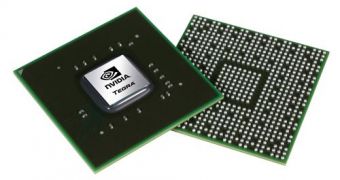NVIDIA hasn't exactly been in the most fortunate or favorable of positions over the past few months, obviously because Advanced Micro Devices has been having the large field of DirectX 11 graphics all to itself. Still, the company seems to be ready to score in another area through its development of the Tegra 2.
NVIDIA's first-generation Tegra has already been used in a variety of gadgets, such as the Boxee Box and Zune HD, but recent rumors seem to imply that this performance will look like a sickling babe compared to what the Tegra 2 is expected to accomplish. Tech Eye reports that a “source close to NVIDIA” said that the chip was hard to make and that the GPU maker poured no less that $600 million into the project. The same source also notes that no less than 500 engineers worked tirelessly on making the chip.
Naturally, when hearing such details, hype will obviously soar and, at least in this case, it seems quite possible that, for once, end—users' expectations will actually be met in full, perhaps even surpassed. The Tegra 1 was already capable of 1080p HD video playback. While the new platform obviously supports this feature, it is also capable of 3D graphics, can stream video from the web for about six hours and play up to 12 hours of stored HD media files. The Tegra 2 also supports Flash and even voice capability, all this at a power consumption 20 times lower than any common PC.
The very hard to product system-on-a-chip is based on the 40nm process, of which the market has heard so many unfortunate things, although the problems have reportedly been finally resolved. The Tegra 2 includes dual ARM Cortex A9 cores and is about four times as fast as its predecessor. One of the more noteworthy facts is that a video demonstration showed this chip running Unreal Engine 3, which is used by games like Mass Effect, Gears of War and BioShock. This large functionality and very high power efficiency has already set the stage for mass adoption of this platform, and Tech Eye even says that “every major computer maker” will go for it.
Indeed, these reports seem to be enforced by other rumors and revelations, particularly those relating to tablets. MSI was already shown to be working on a Tegra-powered slate PC, as was ASUS, and tech Eye says that even Dell is planning on joining the bandwagon. In the end, it seems that only the price of the system-on-a-chip will determine if the next-generation Tegra scores as many design wins as NVIDIA hopes for.

 14 DAY TRIAL //
14 DAY TRIAL //